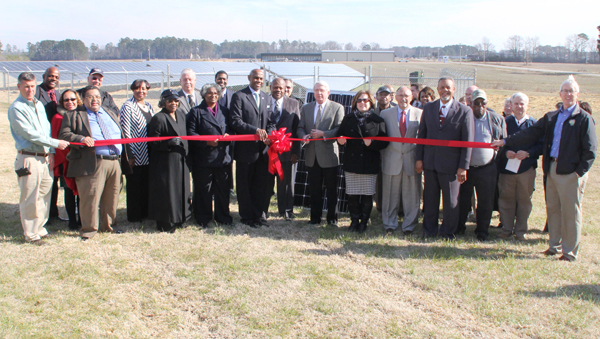More than forty million people in rural communities are served by Rural Electric Cooperatives. These electric utilities are incorporated as cooperatives: each customer who receives power has an ownership stake in the cooperative and a right to vote in elections for the governing board members.
Benita Wells with Southern Echo in Mississippi and Bri Knisely with Appalachian Voices in Tennessee are co-chairs of the Democratizing Rural Electric Cooperatives working group of the Advancing Equity & Opportunity collaborative. They work at the intersections of economic and racial justice to build democratic participation in energy companies that are owned by the people they serve. Holmes Hummel sat down with them to talk about rural organizing with member-owners of electric cooperatives and how they’re working to give member-owners more representation in their cooperatives.
To be in touch or get involved, visit www.ElectricCoopOrganizing.org
The transcription of this interview has been edited and condensed. To hear the full conversation, watch the video above.
HH: Why are you motivated to organize member-owners of rural electric cooperatives?
BK: At Appalachian Voices, we organize across Tennessee, Kentucky, North Carolina, Virginia, and West Virginia. In Tennessee, approximately 2.5 million homes and businesses are served by electric cooperatives covering seventy percent of our state. Most of the land area of the continental U.S. is served by rural electric cooperatives. We work with member-owners on democratization of their electric cooperatives, which are founded on a principle of democratic member control. I’m excited about it because it provides an opportunity for us to do rural organizing in a way that advances participatory democracy, better representation in rural areas, and community control over resources.
BW: At Southern Echo, we work with member-owners of 11 of the 26 cooperatives in the state of Mississippi. My entire family on my father’s side are all member-owners in a rural electric cooperative, including my grandfather, who did not know he was a member-owner before he passed away.
HH: How did these electric cooperatives form, and how are the communities that you know best organizing to engage their electric cooperative leaders?
BK: Electric cooperatives were a New Deal project, and they were really founded to improve quality of life in rural areas. By the time most cities in the U.S. had been electrified in the 1930s, most of the rural areas still did not have electricity because it wasn’t profitable for private companies to deliver them utility service. Once the Rural Electrification Act was signed, rural communities came together and organized, and within two decades, most rural areas had electricity. Members of the communities put forth their initial membership fee, which I think was a couple of bucks at the time, and their electric cooperatives ran electric lines faster than any private company was ever able to do. And this project was really about improving quality of life in rural areas and making sure that rural areas weren’t left behind and that there wasn’t a technological divide. Electric co-ops can and should address issues in rural communities today through involving members in their decision-making.
BW: Rural electric cooperatives are vehicles of economic development in the communities that they serve. When they are not living up to duty by making investments, it negatively impacts the community and its infrastructure. When young adults move out, it’s really sad. We’re trying to engage the electric cooperatives now. We start with educating the member-owners about the fact that they are member-owners and the fact that you do have to hold your board accountable. Your household has a vote, and you should exercise it. Once they’re educated, they know that they have to engage more.
For example, you have to attend the annual member meeting where typically a third of the board members are up for election every year. It’s important to know who’s running for your board, what is their platform, what are they going to do for your community? Change in rural cooperatives can catalyze change in the communities they serve, and it starts with the member-owners.
BK: We’ve been working with member-owners who are trying to address overcompensation for their board members, where a board member who has a couple of meetings a month gets paid $50,000 a year by the cooperative where the median income is around $20,000. We have member-owners who have been trying to get investment programs for solar and energy efficiency at their co-ops. The most recent issue that’s been really big with the member-owners that we work with is around broadband expansion. Electric co-ops have the opportunity to provide broadband internet to rural areas in places where there isn’t any internet access at all, and that’s a really big issue.
BW: We are working on campaigns for individuals who want to run for the board who are community centered. So the community members come together and pick their candidate, and that’s the person that they will put their support behind. So that’s very important. When you talk about the pay for the board, when you look at the management structure and who the larger cooperative hires, a lot of the time, it is not a person of color. They don’t look like the communities that they serve.
In Lee County, Mississippi, where the average income is around $25,000, we may have an office manager making $180,000. There is nothing that is equitable about that at all. And the residential member-owners are often subsidizing the agricultural industry in Mississippi. It’s not fair to the member-owners. I get frustrated when I talk about these types of things because I know the benefit that the cooperatives could have and could offer to the community if they just lived up to the principles on which they were formed — like democratic member control.
BK: There are approximately sixty co-ops that cover the areas in three states that we work with at Appalachian Voices: Tennessee, North Carolina, and Virginia. Most of the landmass is covered. If you’re in a rural area, most likely you are served by a rural electric cooperative unless you’re in a small town that has a municipal utility. Many of our persistent poverty counties in Tennessee and North Carolina are served by rural electric cooperatives, and that is also true across the country.
[Editor’s note: Persistent poverty counties are counties in which more than one-fifth of households have experienced poverty every year for a generation. These conditions ultimately prevent families from improving their homes and buildings. As a result, most buildings are energy inefficient and require more energy to heat and cool, leading to higher utility bills that increase the burden on these households.]
BW: The burden of energy costs is not specific to rural Mississippi or Kentucky. In rural areas across the country, people are dealing with high energy costs, and they’re having to give up other things in order to pay their energy bills. They are giving up medications, education, and so many different things. On listening tours, community members across the states, not just Mississippi, share stories like giving up insulin in order to pay for electricity bills, which is why this work is so important.
BK: In the Southeast, we have a higher energy burden, and a lot of that has to do with aging housing stock. Some of it might have to do with the fact that our temperatures are getting higher because of climate change. The burden of energy costs is definitely higher in rural areas, and those are the areas that are served by electric co-ops.
BW: In Mississippi, there are also a lot of senior citizens on fixed incomes in rural areas. They cannot afford the $700 or $800 electricity bills that they receive on a monthly basis.
HH: How does this intersect with the work that you’re doing with member-owners who are seeking to engage the governing board members of their electric cooperative?
BW: In Mississippi, we have electric cooperatives with a board of all white men in a county or service area that is majority African American, and they do not necessarily represent the interests of the community. So democratizing the board of cooperatives is very important. We start with educating the community first, and a lot of them do not realize they are members and owners of an electric cooperative. The member-owners have to hold the board members accountable because in Mississippi there is little governance and oversight when it comes to electric cooperatives. We’re dealing with boards that are lining their pockets, unfortunately, and they should be working in the best interest of the community to provide electricity at cost or at low cost.
BW: One electric cooperative in Mississippi invested the funds from the member-owners to purchase a golf course that African Americans were not allowed to become members of, which is outrageous. The cooperative is also one of the biggest contributors to political campaigns. A majority of the time, they’re supporting Republican candidates. The member-owners don’t realize that their funds are going to these election campaigns. We see majority African-American communities voting one way, and the electric cooperatives are supporting another candidate that the member-owners do not necessarily support or feel like is in their best interest. It is truly unfortunate to see that.
BK: The electric co-ops are largely unregulated. They’re not typically regulated by public service commissions. They’re supposed to be regulated by their members. But often what we see is that just isn’t happening. There are some co-ops across the U.S. that are doing a lot for their member-owners. For example, Roanoke Electric Cooperative in North Carolina has implemented a lot of programs that significantly improve quality of life for member-owners, like the Upgrade to Save program that helps member-owners get building efficiency upgrades. They also have a broadband program. Their cooperative also has a community center called the Roanoke Center, where they’re running a program in which Black landowners learn about forestry and sustainability on their land to improve land retention.
Electric cooperatives hold immense opportunity for community members to influence how resources are implemented and significantly improve quality of life. That’s the potential that we’re talking about. But that isn’t going to happen if the co-op board is not representative of its members.
The research team for Social Policy found that five percent of rural electric co-op boards in the southeast are white and ninety percent are men. That does not reflect the population here. And if we want co-op boards to be able to better address the issues of communities, they have to be representative. We have supported member-owner groups here that have been organizing at their co-ops. One group in particular ran a board campaign a couple of years ago. They were met with fierce opposition from the incumbents because the incumbents had been on the board for decades, some of them more than thirty years. And that’s not an atypical story. You run into that at a lot of electric co-ops. I just can’t stress enough the immense importance of trying to get these boards more representative.
HH: How would you suggest rural organizers get involved?
BK: If you’re a member-owner in the Southeast or just an activist and organizer, maybe you’re with an organization and you want to start getting involved in organizing at the electric cooperatives in your area, please reach out to our network, which is called Advancing Equity and Opportunity. It’s pretty self-organized. It wouldn’t exist if the people didn’t want it to exist. It gets participation from organizations and member-owners, which makes it a really cool space. We work on projects and strategize together.
If you are not from the Southeast and you still want to get involved in electric co-op organizing, the New Economy Coalition has a Rural Electric Cooperative Working Group. They helped to pull together this awesome toolkit that has resources from organizations across the country that have been working on electric co-op democratization and getting programs implemented, expanding energy efficiency and renewables and more.
BW: This online toolkit is really important because you don’t have to start from the beginning. There are people who have been working doing this work for years, decades even. And so it is a very powerful resource to have there. Even for me, even though I’ve been doing this for a while, it’s still really good to have a resource and even just a collaborative to say, “Hey, this is the issue I’m coming up against.” And everyone in every state is in a different place. It’s really great to have a space where you can come together, share best practices, share some things that work, share some things that didn’t work, and just ask questions because sometimes you’re just bumping your head against a wall. This resource really helps.
HH: Any final words for interested organizers in rural communities with electric cooperatives?
BW: I’m very excited by the prospect of having additional people to learn from and to learn with and to work with. And it’s important work. No matter how old I am, organizing member-owners of electric cooperatives will always be something that I want to do.
BK: We all learn from each other. I’m from a rural community myself. I grew up in a town of like a thousand people that my family’s lived in for five generations. All rural places are different. We have things to learn. But I think one of the important things about this work for me — and for a lot of the member-owners and groups that participate — is that we’re coming together in solidarity and we’re building power together.
Read the entire issue on Organizing in Rural America.



